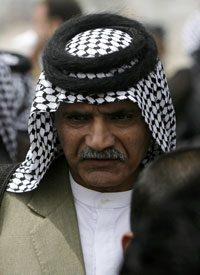
"The general commander [Prime Minister Nuri al-Maliki] is affirming that the killing of two citizens and detaining of others in Kut is considered a violation of the security pact," said Reuters news, quoting an official in the office of Major General Qassim Moussawi, the Iraqi government’s security spokesman.
"[Maliki] asks the commander of the multinational forces to release the detainees and hand over those responsible for this crime to the courts."
Reuters quoted Nidhal Abdul Munem, the sister of the man killed in the raid, who related the event: "They invaded our house, shot my brother and my sister-in-law and herded us into one area. All the while, we tried to ask, ‘Why are you doing this?’ "
The Washington Post reported that the raid was conducted at the multi-family house of Capt. Muaamer Abid Naama al-Bidyree, who, according to his relatives, is assigned to the Interior Ministry’s internal affairs office. Bidyree was not home. "The wife was alone in the house," the Post quoted Um Amar, a female relative who lives in the house. "She started yelling: ‘Americans, Americans!’ "
U.S. troops opened fired on Bidyree’s brother Khalid, who was armed, and Bidyree’s sister-in-law, Nedal Abolabas, who apparently got into the line of fire and was struck.
A U.S. military statement said soldiers opened fire on Khalid because "forces assessed him to be hostile." The statement said Abolabas "moved into the line of fire and was also struck by gunfire."
Um Amar said high-ranking U.S. military officials visited her home the afternoon of the raid to offer an apology and return cash and cellphones that soldiers confiscated during the raid. "They said it was a mistake," she said, during a telephone interview with the Post. "But they couldn’t return those who died back to us."
U.S. troops also arrested six Iraqis suspected of having links to Shiite militia. However, at a news conference held in Kut, Iraqi Major Gen. Read Shakir Jawdat, head of the provincial police, announced that the detainees had been released. Jawdat was joined by U.S. Col. Richard Francey, who offered condolences to the family of the woman killed.
The pact agreed to by the U.S. and Iraqi governments, which took effect on January 1, requires U.S. commanders to coordinate raids and other pre-planned strikes with the Iraqi government and military, unless conducted by joint U.S.-Iraq units. The agreement also states that American forces can be prosecuted in Iraqi courtrooms for grave, premeditated crimes that are committed off base and while off duty.
Iraq’s military spokesman, Maj. Gen. Qassim al-Moussawi, in a statement quoted by AP, described the incident as the "first violation after signing the security pact."
A U.S. military spokesman said U.S. troops acted within the framework of the security pact, stating that "the operation was fully coordinated and approved by the Iraqi government."
Agence France Presse reported that Iraqi Defense Ministry spokesman Major General Mohammed al-Askari told AFP that the two provincial commanders have been accused of "permitting an American military force to carry out a security operation after 1:00 am (2200 GMT) without the knowledge of the defense ministry or the Iraqi government."
The two commanders have been detained.
AFP also quoted a U.S. military statement: "In an operation fully coordinated and approved by the Iraqi government, coalition forces targeted a network financier, who is also responsible for smuggling weapons into the country. As forces approached (the financier’s) residence an individual with a weapon came out of the home. Forces assessed him to be hostile, and they engaged the man, killing him."
The statement also noted that the woman killed during the raid "moved into the line of fire" and died of her gunshot wounds after receiving treatment from an army medic.
From the various reports cited, it is reasonable to assume that the killing of the two Iraqis was a tragic mistake. U.S. forces in Iraq (and elsewhere) routinely operate under some of the most difficult circumstances possible and, unfortunately, mistakes of this nature inevitably occur. The propensity for such operations increases when the enemy is not a traditional army, but a band of terrorists that hides among innocent civilians.
Furthermore, the fact cannot be escaped that once Saddam Hussein was removed from power, the U.S. role in Iraq became more of a police function than a military one. The distinction is critical: soldiers fight soldiers; police fight crime among civilians. Naturally, a police role involves more interaction with civilians than does a military one.
The greater question is: why are U.S. troops still in Iraq? There was no authority in the U.S. Constitution for our troops to go to Iraq in the first place and there is even less for them to remain there, functioning as police officers. U.S. casualties mount week after week, the cost of the operations adds to our national debt on a daily basis, and, as the Kut incident demonstrates, the longer our forces remain, the more Iraqis we will infuriate. By the time we eventually leave, the entire nation will be anti-American.
On the occasion of our fifth anniversary in Iraq, Rep. Ron Paul (who failed in his quest to achieve the Republican presidential nomination), observed in his "Texas Straight Talk" column" for March 27, 2008:
The invasion and continued US occupation has strengthened both Iran and Al-Qaeda in the region. Continuing down the road of a failed policy will only cost more money we do not have and more lives that should not be sacrificed. Interventionism has produced one disaster after another. It is time we return to a non-interventionist foreign policy that emphasizes peaceful trade and travel and no entangling alliances. We can begin by withdrawing from Iraq immediately.
— Photo: AP Images


